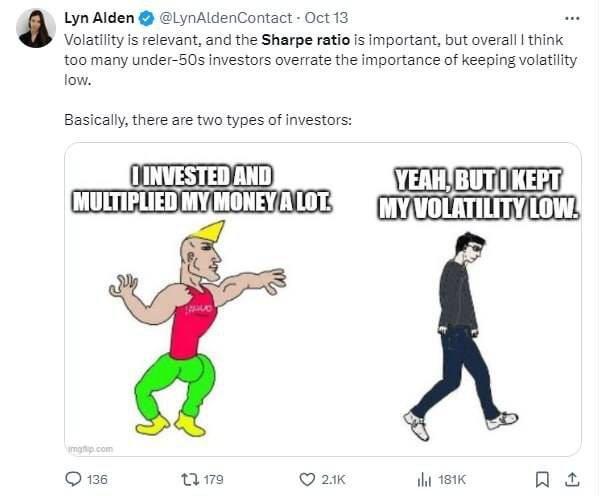A few years ago, I left a stable, well-paying job to dive into crypto full-time. At the time, it felt like a gamble, not just financially, but socially too. But when I looked at the numbers, house prices, cost of living, how long it would take to "make it" through a traditional path, I realized something:
If I stayed the safe route, it might take 20 years to own a home. Maybe longer to have real freedom.
So I asked myself: Why not take the risk now, when I still can?
Crypto, despite all its chaos, offers something rare, the chance to compress time. If you build the right skills, make smart bets, and stay long enough in the game, you might change your life in 2–3 years instead of 30.
Of course, it comes with sacrifices. Volatility, stress, uncertainty. But like you said, life is a series of choices and trade-offs. And for me, betting on an exponential domain like crypto felt like the most logical and courageous path.
Not because it guarantees success, but because it gives you a shot at a life that’s actually yours.
And to be honest, that’s worth something.
On CT, you see it every day. People measure their wealth by how much money they have at a certain age. Or by how many crypto cycles they've been through. But is it the best way to measure it?
Typically, you see two kinds of people: the steady saver & the guy who risks big every time with huge portfolio swings as a consequence.
I have a friend, a TradFi guy, who is obsessed with the Sharpe ratio, let's call him TradFi Sam. When comparing two assets, the one with a higher Sharpe ratio appears to provide better return for the same risk, which is usually attractive to investors.
The Sharpe ratio assumes returns are normally distributed, but for crypto, returns are often highly skewed (big upside or downside) + have fat tails (extreme events are more common). The Sharpe ratio doesn't fit for crypto because it misinterprets volatility, assumes normal markets (lol), and relies on unreliable inputs in highly speculative, non-linear markets.
But let's say we have two people: TradFi Sam is 28 and has $500,000 saved up. He loves the Sharpe ratio, and wants as little volatility as possible. Degen Alex, on the other hand is really comfortable with risk, is 31, and only has $80,000 in the bank. At first glance, TradFi Sam might look more successful.
But when you look closer, their stories are very different. Sam got to $500,000 by working hard, getting regular raises, and saving carefully every month in his TradFi job. Sam’s savings grew slowly and steadily, going up a bit each year, no big surprises.
Degen Alex’s story is full of ups and downs. At 27, Alex made $200,000 from a side business selling t-shirts on the web. At 28, he lost most of it on SafeMoon. At 29, he got lucky with $WIF and made some of it back. Some years, Degen Alex made a lot. Other years, he barely scraped by. Alex kept taking risks, rolling the dice to see what might happen.
Because of this, it’s hard to say where Degen Alex’s future will lead. Maybe next year he’ll make it big in trading and make a million. Or maybe he’ll lose more money, then bounce back later. Anything is possible. TradFi Sam, on the other hand, will probably just keep saving and growing his money slowly.
The point is: if you want to get really rich, playing it safe won’t get you there fast. Taking risks can bring big rewards, but also big losses. It’s scary and unpredictable, and you can’t just compare yourself to what others have at your age. Some days will feel exciting and give you hope. Other days will make you doubt yourself. The key is to keep believing in what you’re doing.
Don’t let “average” numbers or what other people have stop you from trying something bold. For example, you might read that most people your age should have a certain amount saved, but if you’re always worried about falling behind, you might never make a move that changes your life.
That risky move could have been your big break. Or maybe it sets you back for a while, but not forever. Playing it safe might help you reach small goals, but it could keep you away from reaching your biggest dreams.
In the end, there’s nothing wrong with TradFi Sam’s steady path. Some people are happy with a safe, quiet life and sleeping well at night. But if you dream big and want something more, forget the comparisons. Forget the timelines. Just keep trying, be kind to yourself, and don’t give up. The journey is what matters most.
We are in a hypergamble era, and if you are young, you have plenty of time, and are not afraid of huge portfolio swings, then what do you really have to lose by taking huge calculated +EV bets consistently?

9.95K
147
The content on this page is provided by third parties. Unless otherwise stated, OKX is not the author of the cited article(s) and does not claim any copyright in the materials. The content is provided for informational purposes only and does not represent the views of OKX. It is not intended to be an endorsement of any kind and should not be considered investment advice or a solicitation to buy or sell digital assets. To the extent generative AI is utilized to provide summaries or other information, such AI generated content may be inaccurate or inconsistent. Please read the linked article for more details and information. OKX is not responsible for content hosted on third party sites. Digital asset holdings, including stablecoins and NFTs, involve a high degree of risk and can fluctuate greatly. You should carefully consider whether trading or holding digital assets is suitable for you in light of your financial condition.


